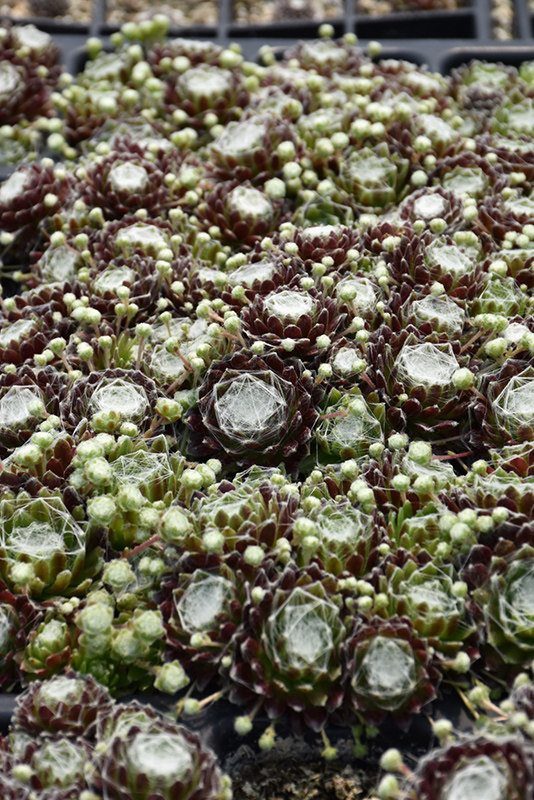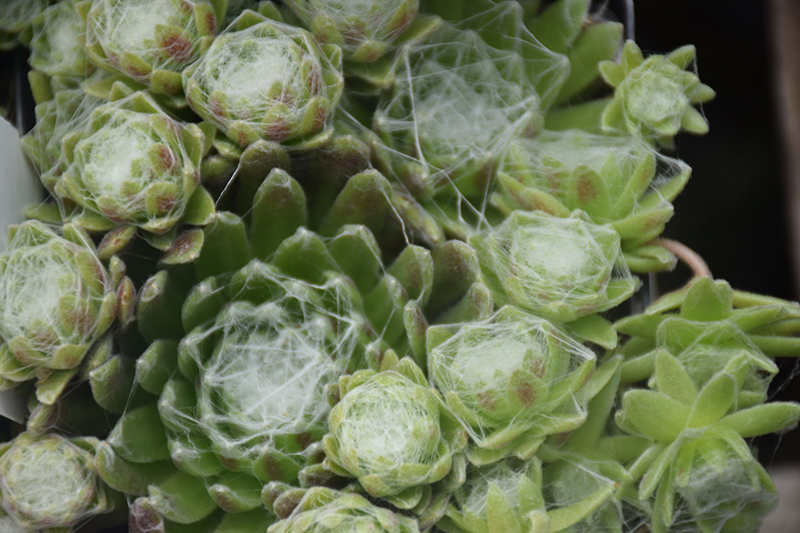Cobweb Buttons Hens And Chicks
Sempervivum arachnoideum 'Cobweb Buttons'
Plant Height: 3 inches
Flower Height: 8 inches
Spacing: 12 inches
Sunlight:
![]()
Hardiness Zone: 4b
Other Names: House Leek
Description:
Small, tightly massed, button-like rosettes of succulent leaves are covered in fine silver hairs, resembling a network of cobwebs between each leaf and between the rosettes; an unusual garden or container plant
Ornamental Features
Cobweb Buttons Hens And Chicks is primarily valued in the garden for its distinctive form, with the flower stalks towering over the foliage. It features unusual clusters of hot pink star-shaped flowers with dark red bracts rising above the foliage in mid summer. Its attractive tomentose pointy leaves emerge chartreuse in spring, turning bluish-green in color with hints of silver throughout the season.
Landscape Attributes
Cobweb Buttons Hens And Chicks is a dense herbaceous perennial with tall flower stalks held atop a low mound of foliage. It brings an extremely fine and delicate texture to the garden composition and should be used to full effect.
This plant will require occasional maintenance and upkeep, and should not require much pruning, except when necessary, such as to remove dieback. Deer don't particularly care for this plant and will usually leave it alone in favor of tastier treats. Gardeners should be aware of the following characteristic(s) that may warrant special consideration;
- Spreading
Cobweb Buttons Hens And Chicks is recommended for the following landscape applications;
- Rock/Alpine Gardens
- Border Edging
- General Garden Use
- Container Planting
Planting & Growing
Cobweb Buttons Hens And Chicks will grow to be only 3 inches tall at maturity extending to 8 inches tall with the flowers, with a spread of 12 inches. When grown in masses or used as a bedding plant, individual plants should be spaced approximately 12 inches apart. Its foliage tends to remain low and dense right to the ground. It grows at a medium rate, and under ideal conditions can be expected to live for approximately 20 years. As an herbaceous perennial, this plant will usually die back to the crown each winter, and will regrow from the base each spring. Be careful not to disturb the crown in late winter when it may not be readily seen!
This plant should only be grown in full sunlight. It prefers dry to average moisture levels with very well-drained soil, and will often die in standing water. It is considered to be drought-tolerant, and thus makes an ideal choice for a low-water garden or xeriscape application. It is not particular as to soil pH, but grows best in sandy soils, and is able to handle environmental salt. It is highly tolerant of urban pollution and will even thrive in inner city environments. This is a selected variety of a species not originally from North America. It can be propagated by division; however, as a cultivated variety, be aware that it may be subject to certain restrictions or prohibitions on propagation.
Cobweb Buttons Hens And Chicks is a fine choice for the garden, but it is also a good selection for planting in outdoor pots and containers. It is often used as a 'filler' in the 'spiller-thriller-filler' container combination, providing a mass of flowers and foliage against which the larger thriller plants stand out. Note that when growing plants in outdoor containers and baskets, they may require more frequent waterings than they would in the yard or garden.

